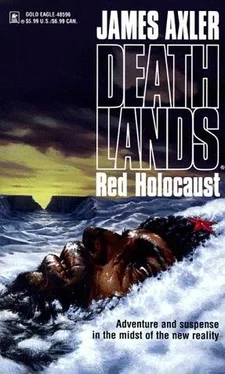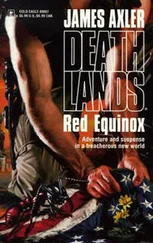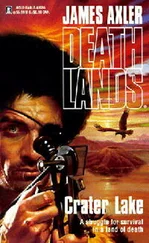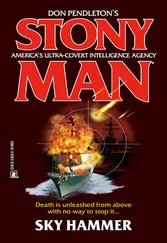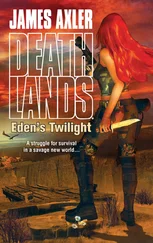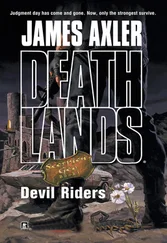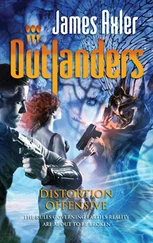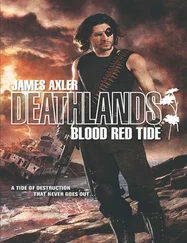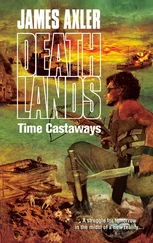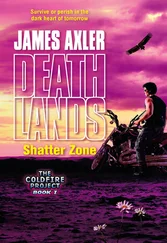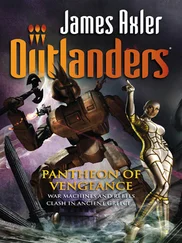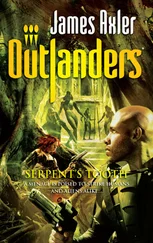"Linked to a sonic pickup, I guess," he continued. "Been watchin' us since we left the gateway. Watchin' us now."
"Not now," said Okie, hugging her beloved M-16A1 carbine against her hip, with the stock collapsed, and ripping off a short burst at the camera. Half a dozen 5.56 mm rounds spat from the eleven-inch barrel and exploded into the concrete, pulverizing the little camera. The spent rounds screamed and bounced along the corridor.
"That's brilliant," said Krysty. "Real brilliant."
"Keep your lip sewn up or..." the tall blaster began, turning angrily toward the other girl. But Ryan stepped between them.
"Enough."
"Sure. Take that slut's part, Ryan. Look after your bawdy-house hooker."
"I said enough , Okie. There's eight of us here. Either we watch each other's backs or we can all be dead. It's not a fuckin' game, lady."
"Mr. Cawdor!" shouted Doc, pointing with a tremulous finger down the corridor.
It was as he'd guessed. The passage was split into sections, each separated by retractable armor-plated bulkheads. One of them was dropping from the ceiling like an executioner's ax, bisecting the corridor. Before any of them could move, it settled solidly in place on the floor with a metallic clang.
"Bastard!" spat Ryan, spinning around to see precisely what he'd expected. Twenty paces or so in front of them, another door was falling, inexorably sealing them to an exitless part of the complex. And it looked as if the bulkheads were made of some vanadium alloy that would resist their plastic explosives and grenades.
"No bombs," pleaded J.B., looking quickly around the group. "The concussion could kill us."
There was a dreadful moment of tension. Everyone in the party except Krysty and Doc had often put their lives on the line. On the war wags, ambushes and traps were part of everyday life. The best chance of escape was almost always in the first paralyzing breaths. Everyone knew that.
Now all of them moved and turned like caged animals, fingers white on triggers, eyes raking the walls and floor and ceiling for some hint of an escape route. But the only marks that sullied the smooth whiteness were the pockmarks where Okie had wasted the vid camera.
It was a frenetic ballet of nerves. Knowing that everyone was riding the knife edge, Ryan called for calm. "Easy. Easy. Whoever it is, they've got us cold."
A voice reverberated from a hidden speaker, so distorted that it was difficult to tell whether it was male or female, young or old. But the message was clear.
"All dressed up to kill... but look who's goin' to die. Guns down, slow and easy. Hands up on heads. You have ten seconds, then I let the gas in. It'll kill you in less'n half a minute."
Ryan spotted another camera near the top of the bulkhead in front of them and guessed the speaker was linked to it. Which, he realized, was a useless bit of information.
"Quickly!" the voice barked, changing then, frighteningly, to a childish whisper. "Do it. Game's done. Ally, ally oxen free. Ally, ally oxen free."
Ryan put his guns on the stone floor and placed his hands on his head. The others followed.
After the nuclear holocaust of 2001, Russia ceased to exist. The U.S.S.R. vanished overnight and, in sixty searing minutes, the purging flames of the brief war that ended all wars destroyed every single Russian city and industrial complex. Every armaments factory and missile base, every port and bridge, was nuked. The destruction was total.
In places — particularly the farthest recesses of the north and east in the devastated Kamchatka Peninsula, in Siberia and the parts of old Russia near North America — the nuclear winter lingered just as in other regions of the globe, the leaden skies and bitter cold had reigned for a generation.
To survive in temperatures that rarely rose above five degrees required a brutal adaptation. The trees of the taiga were destroyed; only a few stunted, mutated pines were left in millions of acres. Most of the wildlife had succumbed as an almost universal death spread across the North. What animal life survived became mutated like the trees.
And the children of the people who survived, many of them were born mutated like the animals.
The peasants in the Russian hamlet of Ozhbarchik knew little of living. What they understood was how to barely exist. They understood how to maintain the breath in their scrawny bodies on a diet of dried fish and the occasional lucky find of the carcass of a small mammal that the wolves had abandoned. Beyond that, there was watery milk from the village's four rack-boned cows, and an endless diet of potatoes, turnips and other root vegetables. One of the peasants owned a few chickens, and once every few weeks found a tiny egg among the rotting straw.
In these tumbledown hovels, which were scattered along a shallow valley about fifty miles from the sea, there lived thirty-seven men, nineteen women and four children. Only one of the villagers, a man, was older than thirty-five. The grubbing lives of the people of Ozhbarchik were brutish and short.
One of the children of the village, a young boy had the rheumy-eyed, vacant stare and slobbering, sagging mouth of a congenital idiot. His right hand had no thumb, and on his left hand were crammed eleven shrunken, residual digits. Beneath the torn cloth and stinking furs he had two separate and distinct sets of genitalia. One set was male.
One was not.
The group of men surrounding him weren't familiar. A few of them were large men and rode horses, but most of them were small and were astride squat, shaggy ponies. All of them wore layers of fur over their bodies and heavy fur hats halfway over their slanted eyes. Most had rifles slung across their shoulders. Behind them was a train of a dozen pack horses carrying bigger guns and food.
The boy smiled and nodded. Strangers were rare in Ozhbarchik. Strangers meant happiness; he knew that. Sometimes there was music and dancing; he liked that, liked to caper with his ponderous steps, his head swinging low, his hands pawing the air like a mutie polar bear. When he danced like that, his mother and father laughed.
It was good.
The man leading the party of riders was tall, close to six feet. His eyes were almond shaped, with golden irises. His mouth was thick lipped and kindly. Around his forehead he wore a band of beaten silver with a large ruby at its center. His name was Uchitel, and he was nicknamed the Teacher because he was almost the only one in the band who was literate. But that wasn't what made him the leader.
"Boy," he called.
"Yes, master," replied the boy, as he'd been taught, bowing, low.
"This is Ozhbarchik?"
"Yes, master."
"There is food here?"
"Yes, master."
Uchitel nodded. "It is good to see such politeness in one so young. Surely the fathers here teach their children well." The lad grinned, shuffling his booted feet in the powdery snow. "They will welcome strangers and will give us food and wine, will they not?"
"Give, master?" The boy was puzzled. They didn't "give" anything to anyone. They sold or traded or bartered. There was little enough for them.
"Yes, boy. Give us all food? Do you not understand that?"
Despite his idiocy, the lad knew when something was wrong. The smile disappeared from his face as he backed slowly away. "We do not give food, master. No food to give. Poor."
Uchitel turned in his saddle, nodding sagely to the group's incendiary expert, Pyeka, the Baker — the baker of men.
"This spark of sunlight says that his people are poor, Pyeka."
"It is sad to be poor, Uchitel."
"It is truly sad to be poor." To the retreating boy, he said, "Are all poor in your village?"
The stranger's face hadn't changed. There was no anger in the voice, no scowl to the wide mouth. The strange yellow eyes remained fathomless, inscrutable. But something was different. The young boy was so terrified that his bowels loosened and he fouled himself.
Читать дальше
